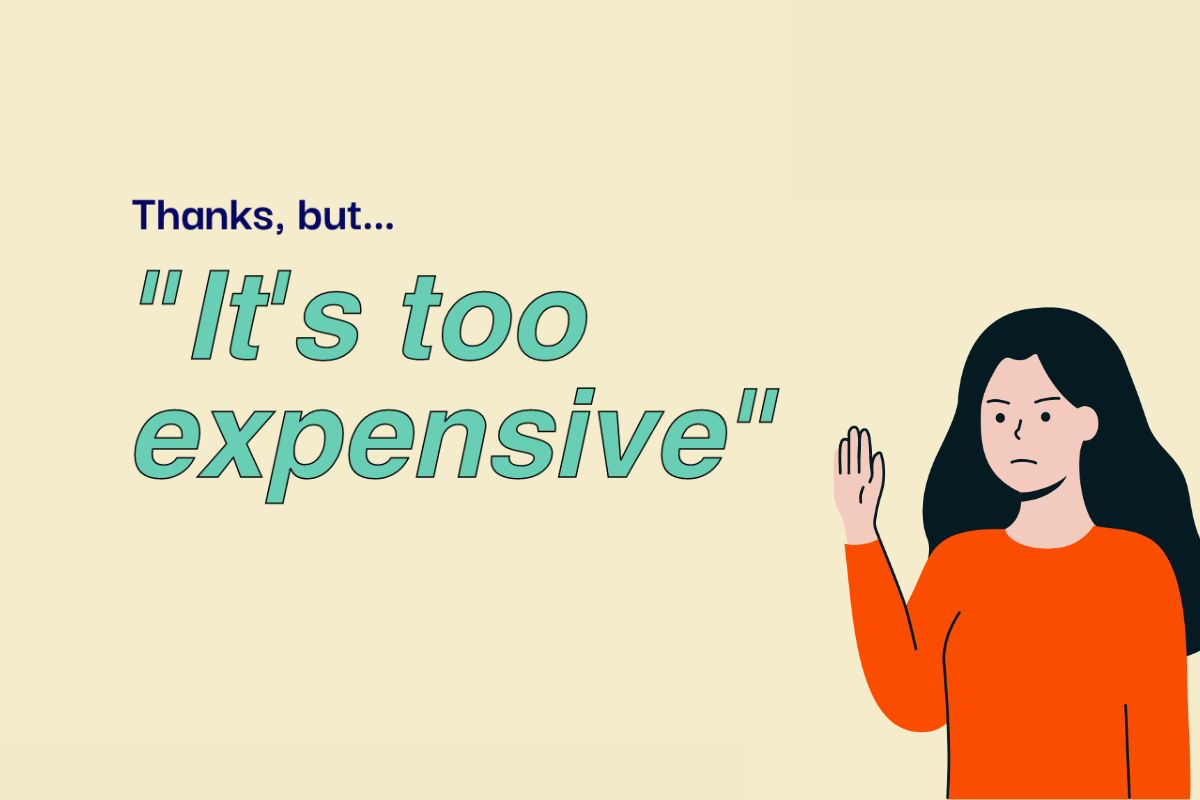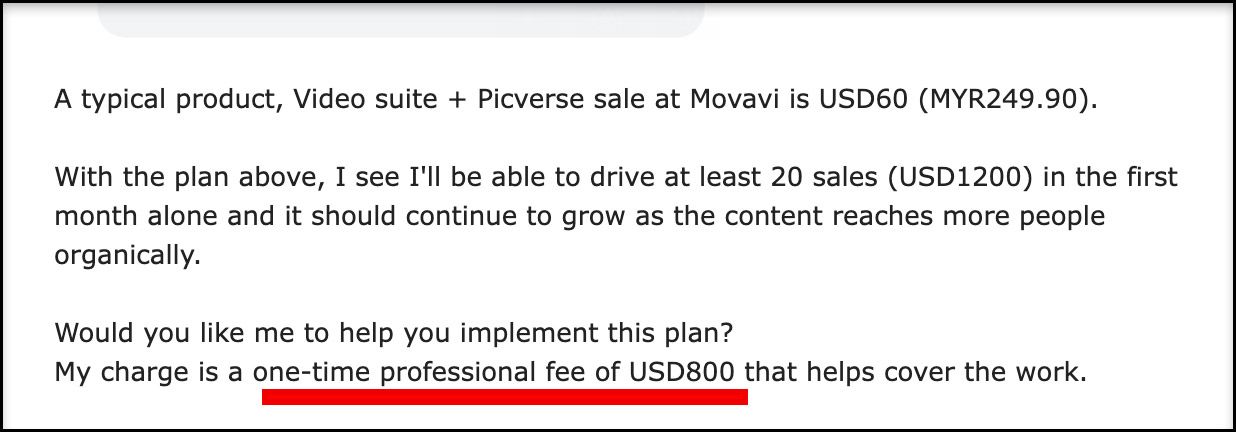How to handle – "it's too expensive"
What are customers really saying when they say "it's too expensive"? Here are 5 ways to deal with that rejection.

Especially if you are in a B2B business, you've probably faced this rejection before.
"Umm... it's too expensive"
Maybe next time.
Then you never hear from the client anymore in 12 months.
What "it's too expensive" means.
Sometimes, it really means there isn't enough money to pay for what you're offering.
If you're trying to sell BMWs to the poor – they don't have enough money for it.
And yes, it's sad when that happens in education.
But most of the time, in situations where the buyer has enough money for it, "it's too expensive" really means "it's not worth it for the money".
One person might say an iPhone is too expensive and ends up buying a Samsung Galaxy. Someone else might happily pay for the iPhone the moment it arrives at the store.
But here's the weird thing.
Even someone poor will somehow find the money to buy things that they value.
We see this all the time in the smartphone market.
Someone who works as an entry-level clerk or waiter has the latest, newer-than-your iPhone in his pocket. But don't be surprised to find that same person saying the RM59.90 book you're selling – is too expensive.
So when a prospect says "it's too expensive"...
He or she is actually something actually quite specific.
It means – "it's not worth it", at least for the money I'm paying.
Many entrepreneurs who get rejected by price, quickly become shaken. They start slashing their price. "Err... maybe it was really too expensive".
Case example: Consumer product.
I recently had a client who made this mistake.
They sold a consumer product at RM2399. Sales were initially great during the COVID-19 lockdown, due to the nature of the product – it was a hobbyist product.
But after a good 16 months run, as life started returning to normal – sales began to drop.
When they asked their customers why they simply said – "it's too expensive".
What happened?
How come nobody said anything about it being expensive during the lockdown, but when people were free to leave their homes, the product magically became "too expensive?"
The answer is that the customers began to put their spending focus elsewhere. (Holidays, travels, food, etc.)
The market demand changed.
What to do when they say "it's too expensive".
So what do you do if you've been receiving the "it's too expensive" rejection? We got you.
1 - Understand it's never about the price.
First, know that it's never about the price.
Lowering your price is not going to magically make the prospect suddenly interested. They might jump at the bargain, but at what cost?
Not only your product loses its credibility, you also lose potential revenue.
Why is it that even the lowest-income people might say something is too expensive, and yet they'll figure out how to find the money to buy a smartphone?
Because it's never about the price.
It's about whether the value is justifiable to them.
Find out what's missing in your product that is causing them to reject you. Here's a script I use when people say what I offer is too expensive.
Thanks for the feedback. What needs to be added or changed for it to be worth $XXX for you?
The prospect will tell you what's missing. Take that and pivot quickly.
2 - You might be selling to the wrong market.
Not everyone will value your offering the same. (This is true for advertising as well.)
You could try selling female dresses to men and they won't pay attention.
If you're an avid video gamer, an RM2,599 Playstation with two controllers might be the deal of the year. But to someone who despises video games – they won't even notice the offer.
The challenge is not to please everyone and wait for no one to say "it's too expensive". The challenge is to find the few who see the value in your offer.
3 - In relative to what?
When we look at how much something is priced – we usually have a 'reference' pricing.
When I say an RM2,000 shirt is expensive, that's because I compared it to an RM20 t-shirt I saw at the night market the other day.

If you operate a gym, and you sell gym memberships at RM200 per month – you're commoditizing your business. People will look at your price, compare it with other gyms and go for the cheaper one.
A better model for a gym is to come out with fat-burner program packages, priced at RM2,400 each. In that way, your offer stands out. There's no frame of comparison.
The next time a prospect says it's too expensive, find out what they are basing the price on. Then consider repositioning your offer, so that you compete in a 'category of one'.
4 - Help your clients make sense of the investment.
This is a great technique you can use to help your client see the value of whatever they are investing in.
Once, a company approached me for a small content sponsorship on my music production blog. I pitched a price of USD800 to do it.

But instead of leaving it there, I explained how their investment of USD800 could bring them back a potential sale of US 1200, and more.
This helps justifies their investment – and very quickly, the deal went through.
Whatever product or service you provide, help your clients see the potential ROI they will receive upon investing in your offer.
5 - Refer them to someone else.
Sometimes, you might not be the right fit for the prospect – and that's okay. Offer to refer them to another business that is able to help them.
Don't force yourself to work with clients you don't think you can help or who don't fit your business model.
It may feel like you're losing an opportunity – but it's always never a good idea to force a relationship when it's not right.
Few things happen when you refer a prospect to other businesses.
- Your prospect respects your decision and integrity. This raises your perceived demand.
- You can ask for referral incentives from the businesses you refer clients to.
- You choose the type of clients you serve best. And live a life with less drama.
Polish up your sales muscle.
So there you go, these tips should help you overcome the "it's too expensive" rejection and hopefully, you'll be able to grow your business.
If you want to go deeper into sales techniques, here are some books I recommend:
- The Closer's Survival Guide by Grant Cardone
- The Ultimate Sales Machine by Chet Holmes
- To Sell is Human by Daniel Pink
Practice selling online.
Just like building calluses in the gym, you can build 'sales' calluses by selling and getting rejected.
The easiest way to build sales calluses is to sell things online. Sell things you no longer need on Facebook Marketplaces or Carousell – and let the activity of dealing and selling to customers build your rejection muscle and give you momentum.
